|
|
|
Sort Order |
|
|
|
Items / Page
|
|
|
|
|
|
|
| Srl | Item |
| 1 |
ID:
112342
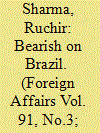

|
|
|
|
|
| Publication |
2012.
|
| Summary/Abstract |
Until recently, there seemed plenty of reasons to be bullish on Brazil. Having posted record growth for a decade and weathered the financial crisis well, the country looked poised to become a global economic leader. But the would-be giant stands on feet of clay. The economy depends too much on high commodity prices, and as demand falls, so may Brazil.
|
|
|
|
|
|
|
|
|
|
|
|
|
|
|
|
| 2 |
ID:
152590
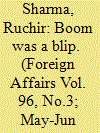

|
|
|
|
|
| Summary/Abstract |
The global recovery from the Great Recession of 2009 has just entered its eighth year and shows few signs of fading. That should be cause for celebration. But this recovery has been an underwhelming one. Throughout this period, the global economy has grown at an average annual pace of just 2.5 percent—a record low when compared with economic rebounds that took place in the decades after World War II. Rather than rejoicing, then, many experts are now anxiously searching for a way to push the world economy out of its low-growth trap. Some economists and investors have placed their hopes on populists such as U.S. President Donald Trump, figuring that if they can make their countries’ economies grow quickly again, the rest of the world might follow along.
|
|
|
|
|
|
|
|
|
|
|
|
|
|
|
|
| 3 |
ID:
116111
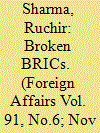

|
|
|
|
|
| Publication |
2012.
|
| Summary/Abstract |
Over the past several years, the most talked-about trend in the global economy has been the so-called rise of the rest, which saw the economies of many developing countries swiftly converging with those of their more developed peers. The primary engines behind this phenomenon were the four major emerging-market countries, known as the BRICs: Brazil, Russia, India, and China. The world was witnessing a once-in-a-lifetime shift, the argument went, in which the major players in the developing world were catching up to or even surpassing their counterparts in the developed world.
|
|
|
|
|
|
|
|
|
|
|
|
|
|
|
|
| 4 |
ID:
191099
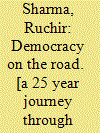

|
|
|
|
|
| Publication |
Gurgaon, Penguin Random House India Pvt Ltd, 2019.
|
| Description |
389p.hbk
|
| Standard Number |
9780670092208
|
|
|
|
|
|
|
|
|
|
|
|
Copies: C:1/I:0,R:0,Q:0
Circulation
| Accession# | Call# | Current Location | Status | Policy | Location |
| 060404 | 320.954/SHA 060404 | Main | On Shelf | General | |
|
|
|
|
| 5 |
ID:
144022
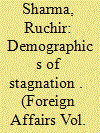

|
|
|
|
|
| Summary/Abstract |
In every single region of the world, economic growth has failed to return to the rate it averaged before the Great Recession [1]. Economists have come up with a variety of theories for why this recovery has been the weakest in postwar history, including high indebtedness, growing income inequality [2], and excess caution induced by the original debt crisis. Although each explanation has some merit, experts have largely overlooked what may be the most important factor: the global slowdown in the growth of the labor force
|
|
|
|
|
|
|
|
|
|
|
|
|
|
|
|
| 6 |
ID:
126271
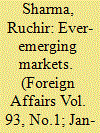

|
|
|
|
|
| Publication |
2014.
|
| Summary/Abstract |
In the middle of the last decade, the average growth rate in emerging markets hit over seven percent a year for the first time ever, and forecasters raced to hype the implications. China would soon surpass the United States as an economic power, they said, and India, with its vast population, or Vietnam, with its own spin on authoritarian capitalism, would be the next China. Searching for the political fallout, pundits predicted that Beijing would soon lead the new and rising bloc of the BRICs -- Brazil, Russia, India, and China -- to ultimate supremacy over the fading powers of the West. Suddenly, the race to coin the next hot acronym was on, and CIVETS (Colombia, Indonesia, Vietnam, Egypt, Turkey, and South Africa) emerged from the MIST (Mexico, Indonesia, South Korea, and Turkey).
|
|
|
|
|
|
|
|
|
|
|
|
|
|
|
|
| 7 |
ID:
133669
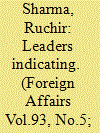

|
|
|
|
|
| Publication |
2014.
|
| Summary/Abstract |
Global investors usually focus on economic data such as GDP growth, employment, and trade. But in today's trying economic climate, they have started to train their gaze elsewhere: on national political leadership and the prospects for reform.
|
|
|
|
|
|
|
|
|
|
|
|
|
|
|
|
| 8 |
ID:
163310


|
|
|
|
|
| Summary/Abstract |
Like most national elections in India, the one coming this spring will be decided in the mofussil. Originally a colonial term for any town outside the commercial capitals of the British Raj, mofussil now refers to the provincial areas beyond the burgeoning megacities of Mumbai and New Delhi, that is, to the rural and impoverished stretches where two out of three Indians live.
|
|
|
|
|
|
|
|
|
|
|
|
|
|
|
|
| 9 |
ID:
145485


|
|
|
|
|
| Publication |
India, Allen Lane, 2016.
|
| Description |
xii, 464p.hbk
|
| Standard Number |
9780241188514
|
|
|
|
|
|
|
|
|
|
|
|
Copies: C:1/I:0,R:0,Q:0
Circulation
| Accession# | Call# | Current Location | Status | Policy | Location |
| 058682 | 330.9/SHA 058682 | Main | On Shelf | General | |
|
|
|
|
| 10 |
ID:
123046
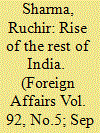

|
|
|
|
|
| Publication |
2013.
|
| Summary/Abstract |
When Nitish Kumar became chief minister of the dirt-poor Indian state of Bihar in 2005, kidnapping was said to be the leading industry in the capital city of Patna. People searching for stolen cars were advised to check the driveway of a leading politician, who reportedly commandeered vehicles for "election duty." Although known for his soft-spoken manner, Kumar cracked down hard. He straightened out the crooked police, ordering them to move aggressively against all criminals, from the daylight robbers to the corrupt high officials. He set up a new fast-track court to speed the miscreants to jail. As Biharis gained the courage to go out on the street, even after dark, Kumar set about energizing a landlocked economy with few outlets for manufactured exports. He focused on improving the yields of Bihar's fertile soil and ushered in a construction boom. Within a few years, a state once described by the writer V. S. Naipaul as "the place where civilization ends" had built one of the fastest-growing state economies in India. And Kumar was recognized as a leader in the new generation of dynamic chief ministers who are remaking the economic map and future of India.
|
|
|
|
|
|
|
|
|
|
|
|
|
|
|
|
|
|
|
|
|